The Bus Contracting Model (BCM), formerly known as the Government Contracting Model (GCM), is a contracting model for public bus services in Singapore.
First announced in 2014, and implemented on 1 September 2016, the BCM brought all public buses and related infrastructure (such as interchanges, terminals, and depots) under the ownership of the government. Under this model, LTA assumes the central role of planning bus services, while public transport operators bid for the right to operate the bus routes in a package.
Competitive Tendering
Bus operators are paid to run bus routes according to service standards set by LTA. The competitive tendering process fosters competition in the bus industry, encouraging operators to adopt a low-cost operating model while running a reliable bus service for commuters, with financial incentives awarded based on good performance. The model also encourages operators to invest in areas like recruitment, staff training, and enhancing the professionalism of the bus workforce.
Presently, there are 14 bus packages managed by four operators in Singapore: SBS Transit, SMRT Buses, Tower Transit Singapore, and Go-Ahead Singapore. The latter two entered the market following the implementation of the BCM.
In addition, the LTA has pursued a unified livery across all public buses in Singapore. Lush Green was chosen as the base colour, having been the preference of the majority of commuters through a public poll.
Comparison of Old and New frameworks
With the Bus Service Operating Licenses (BSOL) for SMRT Buses and SBS Transit expiring on 31 August 2016, LTA took the opportunity to revamp the bus industry into a competitive tendering process. Elements of the scheme were adapted from contractual schemes used in other regions, such as Transperth (in Perth) and London Buses (in London).
The following parts will explain how the BCM works. Alternatively, they are summarised in this video by the Land Transport Authority (LTA).
| Old Model | New Bus Contracting Model |
| Operating assets (i.e. depots, buses) are owned by either the Government or Public Transport Operators (PTOs). | The Government assumes ownership of all* bus assets (i.e. buses, bus depots, bus interchanges, fleet management systems, etc). |
Profit-centered business model results in a slow response to enhancing service standards.
|
The Land Transport Authority (LTA) is the central bus planner.
|
* = except for legacy SBS Transit and SMRT assets, like older buses and bus depots, which are leased by LTA from these PTOs
SBST/SMRT assets leased to LTA (Click to expand)Exceptions to LTA owning all bus assets and depots include:
- SBST/SMRT-owned buses and Woodlands Depot – leased to LTA via availability fees
(SMRT Group Review 2017 / SBST Annual Report 2017) - SBS Transit’s fleet of close to 2,900 buses (in 2016) and Soon Lee Bus Depot – leased to LTA
(Sale & transfer of Soon Lee Bus Depot to LTA in 2024; agreement signed between LTA & SBS Transit in June 2022) - SBS Transit Bedok North Bus Depot, Braddell Bus Park, Bukit Batok Bus Depot, Hougang Bus Depot, Ang Mo Kio Bus Depot
(which remains as SBS Transit property as of SBS Transit 2017 Annual Report)
Bus Contracting Model (BCM) fundamentals
Under the BCM, bus operators are required to:
- Lease operating assets from the Government as specified in the awarded contract.
- Adhere to specified performance standards in operating their assigned bus services.
- Operate and maintain the leased buses and onboard equipment (e.g., fare equipment and fleet management equipment) provided by the Government.
- Operate and maintain the Bus Interchanges and new Bus Depots included in the Route Packages, along with all the equipment and systems provided within.
- Collect and enforce fares approved by the Public Transport Council for travel on the allocated Route Package Bus Services, acting on behalf of the Government.
- Provide bus service information at all bus stops and bus interchanges served by the Route Packages’ Services.
- Offer customer management services, including lost and found services, as well as a hotline for commuter feedback and inquiries.
Additionally, an Incentive Framework is established to encourage operators to deliver quality bus services to commuters and maintain the provided assets effectively. If the operator meets the standards, it can receive a performance payment of up to 10% of its annual service fee. Conversely, if the operator fails to meet the standards, up to 10% of its annual service fee may be deducted. The framework includes five performance indicators covering:
- Bus service reliability, incorporating indicators on Excess Wait Time (EWT) and On-Time Adherence (OTA) as per the Bus Service Reliability Framework.
- First and last bus punctuality to ensure accessibility for commuters.
- Maintenance of the buses provided by LTA.
- Maintenance of the Bus Interchanges and Bus Depots awarded under the Route Packages.
- Maintenance of the Bus Ticketing System.
Advantages of the BCM
The contract model, currently utilized in London and various Australian cities, serves as a model for LTA’s transportation systems. With this model, the government can directly subsidize bus operations to maintain better service levels, even if such levels are unprofitable.
The advantages of this system are:
- Enhances the Government’s capacity to swiftly address fluctuations in travel demand and service expectations.
- Allows bus operators to concentrate on running bus services and fulfilling service standards.
- Reduces entry barriers, fostering increased market competition that leads to the provision of better bus services in a cost-effective manner, benefiting commuters.
Commuters stand to benefit from:
- A more responsive system that adjusts to changes in ridership patterns and commuter requirements.
- Greater competition and efficiency within the bus industry.
- Improved reliability and service levels of bus services.
- Reduced waiting times between buses.
Safeguarding employee welfare
Each new tender or alteration in a contract for bus services may lead to the transfer of bus employees between employers. To safeguard the welfare of these affected employees and ensure their smooth transition to the incoming operator, the Public Transport Tripartite Committee (PTTC) issued the Guidelines on Good Employment Practices in the Public Bus Industry (the “Guidelines”) on 16 September 2014.
These guidelines delineate the obligations and responsibilities of both incoming and outgoing bus operators. They cover various aspects such as the timeline for offering employment, recognition of length of service, protection of employment terms, treatment of affected bus industry employees (including those opting to remain with the outgoing operator), and training for those choosing to join the incoming operator.
The PTTC has proposed three key assurances:
- All affected employees must receive a job offer from the incoming operator.
- Affected employees must be provided with employment terms that are not inferior to those they enjoyed before the transition.
- Affected employees can opt to join the new operator or be redeployed by their current employer, where feasible.
These employee-related aspects of the Guidelines have been integrated into LTA’s tender documents and will also be incorporated into LTA’s subsequent contract with the Operator.
Higher Service Levels
With the transition to a bus contracting model, the Government intended to also raise bus service levels beyond those of the expanded BSEP.
| Pre-BCM | Expanded BSEP | Bus Contracting Model |
| About 30% of bus services operate at headways of no more than 10 minutes | About 35% of bus services operate at headways of no more than 10 minutes | At least 50% of bus services operate at headways of no more than 10 minutes |
| 100% of bus services operate at headways of no more than 30 minutes | 100% of bus services operate at headways of no more than 20 minutes | 100% of bus services operate at headways of no more than 15 minutes, and all Feeder Services operate at intervals of 6 to 8 minutes. |
As a result, an estimated 45% of bus services will have shorter intervals during peak periods when compared to the expanded BSEP service levels.
Tendering Process
LTA evaluates tender submissions using a 2-envelope process, considering both quality and price, with a higher emphasis placed on the quality proposals submitted by the tenderers. Tendering requirements include, among other criteria, a demonstrated track record of operating a fleet of at least 250 buses.
For example, Tower Transit was awarded the PT200 Bulim Bus Package (1st Term) despite submitting the third-lowest bid of $125.6 million per year, while SMRT’s bid was the lowest at $93.7 million per year. This suggests that quality considerations may have carried more weight than price in the decision-making process.
LTA awards route packages (tenders) based on a “Gross Cost Model.” The operator to whom the tender is awarded must establish a local company to manage the Route Packages, with senior management overseeing operations based in Singapore for enhanced oversight and accountability.
Provisions for additional bus capacity will be included in the contract, allowing the government to promptly adjust Route Packages as needed in response to changes in ridership and commuter needs.
Throughout the contract period (5-7 years), the service fee, which constitutes the operator’s bid price for the package, will be adjusted to better reflect the operating environment, considering factors such as inflation, changes in wage levels, and fuel costs. The Operator will receive the service fee on a monthly basis, with deductions for non-operated mileage under its control, such as driver absenteeism.
Additionally, the Operator can access the Bus Driver Training Grant for new bus drivers trained and deployed on the bus services, for a period of time after the contract award date.
BCM Route Packages
In August 2016, the Land Transport Authority announced the consolidation of bus services into fourteen route packages, each comprising approximately 300-500 buses. This number represented an increase from the initially planned twelve packages announced in 2014 with the inception of the Bus Contracting Model scheme.
The contracts for these services are set to run for five years initially, with the possibility of extension for another two years contingent upon satisfactory performance. Contracts awarded from 2023 onwards allow for LTA to consider extensions ranging from two to five years after the initial five-year term.
Initial 3 Tenders
The first three Tendered Contracts (TC) were for the Bulim, Loyang and Seletar Bus Packages, which were announced between May 2014 and June 2016. These packages were awarded to Tower Transit Singapore, Go Ahead Singapore & SBS Transit respectively.
These contracts also ushered in foreign operators Tower Transit and Go-Ahead into the local bus industry.
Full Transition: 1 September 2016
See: Bus industry completes transition to Bus Contracting Model | Land Transport Guru
Following the completion of negotiations with the existing operators (SBS Transit and SMRT), the remaining 11 packages not yet tendered out as of 2016 were extended for periods ranging from 2 to 10 years, commencing from 1 September 2016, marking the full transition of all public bus services to the BCM.
Under these BCM terms, also known as Negotiated Contracts (NC), the LTA prescribes service standards and retains all fare revenue. However, rather than buying over operator-owned assets, the LTA instead leases them from SBS Transit and SMRT. For instance, SBST/SMRT-owned buses are leased to LTA until the end of their 17-year statutory lifespan for a fee equal to buying over the bus at net book value as of 1 September 2016, to be paid over the remaining lifespan of the bus. At the same time, more LTA-owned buses would be leased to SBST/SMRT to meet service requirements where needed, including as replacements for retiring buses. LTA can also reassign these SBST/SMRT-owned buses to other bus operators wherever required.
In total, nearly S$7.2 billion was allocated to SBS Transit and SMRT Buses under the full transition to BCM. The 11 packages are designed to ensure that there will be no change in operators for the bus services currently managed by SBS Transit and SMRT Buses, and consequently, all employees of these companies were not impacted by the transition.
Upon the conclusion of these negotiated contracts, the bus services within these 11 packages will progressively undergo a tendering process. This phased transition approach enables LTA to refine and enhance contract management procedures, as well as the tendering and handover processes, while minimizing the risk of service disruption.
Bus Contracting Model – Timeline:
Notes:
- Owing to periodic contract extensions, the final duration of many ongoing bus contracts is subject to change.
List of Bus Packages
Contract references and periods reflect the current and upcoming term(s) only.
| Package | Contract Ref | Contract Period | Incum- bent |
Current Depot | Bus Services | Interchanges / Terminals |
| Bulim Bus Package | PT217A | 29 May 2021–2026 | TTS | Bulim Bus Depot | 41, 49, 66, 77, 78, 79, 96, 97, 97e, 98/98M, 106, 143/143M, 173, 177, 183, 189, 282, 284, 285, 333, 334, 335, 651, 653, 657, 870, 941, 945, 947, 990 & 992 (31 bus routes) |
Jurong East, Jurong Town Hall, Bukit Batok |
| Loyang Bus Package | PT201 | 4 Sep 2016–2026 (with 2+3 year extension) |
GAS | Loyang Bus Depot | 2, 3, 6, 12, 12e, 15, 17/17A, 34, 36, 43/43M, 43e, 62, 68, 82, 83, 84, 85, 118, 119, 136, 354, 358, 359, 381, 382G/382W, 384, 386, 403, 518/518A, 661 & 666 (31 bus routes) |
Pasir Ris, Punggol |
| Seletar Bus Package |
PT202 | 11 Mar 2018 – 10 Mar 2025 (with 2 year extension) |
SBST | Seletar Bus Depot | 24, 70/70M, 71, 76, 130, 133, 135, 138, 162, 261, 262, 265, 268, 269, 652, 668, 800, 803, 804, 805, 806, 807, 811, 812, 850E, 851, 851e, 852 & 860 (29 bus routes) |
Ang Mo Kio, Yio Chu Kang |
| PT219 | 11 Mar 2025 – 10 Mar 2030 | TBC | (no change) | To Be Confirmed | (no change) | |
| Bukit Merah Bus Package |
PT203 | 18 Nov 2018 – Apr 2024 (with 5 month extension) |
SBST | Ulu Pandan Bus Depot | 5, 16/16M, 57, 93, 120, 121, 122, 123/123M, 131, 145, 160, 170/170X, 195, 198, 272, 273, 400 & 993 (18 bus routes) |
Bukit Merah, HarbourFront, Kampong Bahru, Queen Street, Shenton Way, Marina Centre |
| PT218A | Apr 2024 – 2029 | SBST | (no change) | (no change) | (no change) | |
| Sembawang–Yishun Bus Package | PT217B | 5 Sep 2021 – 2026 | TTS | Mandai Bus Depot | 167, 169, 171, 656, 663, 670, 801, 825, 853/853M, 854, 854e, 855, 856, 857, 858, 859, 882, 883/883M, 963, 963e, 965, 966, 969, 980 & 981 (25 bus routes) |
Yishun, Sembawang, Lorong 1 Geylang |
| Jurong West Bus Package |
PT212 | 1 Sep 2016 – 31 Jul 2024 | SBST | Soon Lee Bus Depot | 179/179A, 181/181M, 182/182M, 185, 192, 193, 194, 199, 240/240M, 241, 242, 243G/243W, 246, 247, 248/248M, 249, 251, 252, 253, 254, 255, 257, 258, 405, 502/502A & 974 (26 bus routes) |
Boon Lay, Joo Koon, Tuas |
| PT218B | 1 Sep 2024 – 2029 | SMRT | (no change) | (no change) | (no change) | |
| Sengkang – Hougang Bus Package | PT206 | 1 Sep 2016 – 2024 (with 3 year extension) |
SBST | Hougang Bus Depot | 27, 51, 80, 86, 87, 89, 89e, 102, 107/107M, 112, 113, 114, 115, 116, 117/117M, 132, 151, 153, 159, 161, 163, 165, 324, 325, 329, 371, 372, 374, 654, 660, 671 & 672 (32 bus routes) |
Compassvale, Hougang Ctrl, Hougang Bus Park, Sengkang |
| Choa Chu Kang – Bukit Panjang Bus Package | PT215 | 1 Sep 2016 – 2026 (with 3 year extension) |
SMRT | Kranji Bus Depot | 61, 67, 75, 172, 176, 180, 184, 188, 188e, 190, 300, 301, 302, 307, 868E, 920, 922, 927, 970, 972/972M, 973, 975, 976, 979, 982E, 983/983M, 985 & 991 (28 bus routes) |
Choa Chu Kang, Bt Panjang, Gali Batu |
| Woodlands Bus Package | PT216 | Sep 2016 – 2026 (with 3 year extension) |
SMRT | Woodlands Bus Depot | 110, 178, 187, 665, 900, 901/901M, 902, 903/903M, 904, 911, 912/912M, 913/913M, 925/925M, 950, 951E, 960, 960e, 961/961M, 962 & 964 (20 bus routes) |
Woodlands, Woodlands Temporary |
| Bedok Bus Package | PT211 | Sep 2016 – 2023* (will be extended) |
SBST | Bedok North Bus Depot | 9, 13, 14, 14e, 25, 30, 30e, 35/35M, 40, 42, 45, 46, 168, 196, 196e, 222, 225G/225W, 228, 229 & 401 (20 bus routes) |
Bedok, Upper East Coast |
| Tampines Bus Package | PT207 | Sep 2016 – 2024* (will be extended) |
SBST | Bedok North Bus Depot | 4, 10, 10e, 18, 19, 20, 23, 28, 29, 31, 37, 38, 39, 47, 65, 69, 72, 81, 127, 129, 291, 292, 293, 296, 298 & 513 (26 bus routes) |
Tampines, Tampines Concourse, Tampines North, Changi Business Park |
| Serangoon – Eunos Bus Package | PT209 | Sep 2016 – 2025* (will be extended) |
SBST | Hougang Bus Depot | 11, 53/53M, 55, 58, 59, 60, 63/63M, 64, 90, 94, 101, 103, 105, 109, 134, 137, 140, 141, 146, 150, 154, 158, 315 & 317 (24 bus routes) |
Serangoon, Eunos, Sims Place, Changi Village |
| Clementi Bus Package | PT210 | Sep 2016 – 2025* (will be extended) |
SBST | Bukit Batok Bus Depot | 7, 32, 33, 48, 74, 91, 92/92M, 95, 99, 100, 111, 147, 156, 166, 174, 174e, 175, 191, 197, 200, 201, 655 & 667 (23 bus routes) |
Clementi, Buona Vista, Ghim Moh, Kent Ridge |
| Bishan – Toa Payoh Bus Package | PT208 | Sep 2016 – 2026* (will be extended) |
SBST | Ang Mo Kio Bus Depot | 8, 21, 26, 50, 52, 54, 56, 73, 88, 124, 125, 139, 142, 155, 157, 186, 230, 231, 232, 235, 238 & 410G/410W (22 bus routes) |
Bishan, Toa Payoh, Saint Michael’s |
Notes:
- Due to periodic contract extensions, the ultimate duration of many existing bus contracts may vary.
- The bus depots and bus interchanges/terminals linked with each package are subject to change, and bus services could be added or removed at LTA’s discretion.
- Service fees provided to bus operators are determined by the awarded sums announced during the contract award. These figures may be adjusted due to inflation and changes in operating mileage resulting from LTA route amendments, new bus routes, or withdrawn bus routes that affect the total mileage covered.
Former Bus Package Terms
| Package | Contract Ref | Contract Period | Incum- bent |
Former Depot | Bus Services | Interchanges / Terminals |
| Seletar Bus Package | PT204 | 1 Sep 2016 – 10 Mar 2018 | SBST | Ang Mo Kio Bus Depot (SBST) / Seletar Bus Depot | 24, 70/70M, 71, 76, 130, 133, 135, 138, 162/162M, 261, 262, 265, 268 & 269 | Ang Mo Kio, Yio Chu Kang |
| PT214 | 1 Sep 2016 – 24 Mar 2018 | SMRT | Ang Mo Kio Bus Depot (SMRT) | 800, 803, 804, 805, 806, 807, 811, 812, 850E, 851, 852 & 860 | – | |
| Bukit Merah Bus Package | PT205 | 1 Sep 2016 – 17 Nov 2018 | SBST | Ulu Pandan Bus Depot | 5, 16, 57, 93, 120, 121, 122, 123/123M, 131/131M, 145, 160, 170/170A/170X, 195, 198, 272, 273, 400 & 402 | Bukit Merah, HarbourFront, Kampong Bahru, Queen Street, Shenton Way, Marina Centre |
| Bulim Bus Package | PT200 | 29 May 2016 – 28 May 2021 | TTS | Bulim Bus Depot | 41, 49, 66, 77, 78, 79, 96, 97, 97e, 98/98M, 106, 143/143M, 173, 177, 183, 189, 282, 284, 285, 333, 334, 335, 651, 663, 665, 941, 945, 947, 974 & 990 | Bukit Batok, Jurong East |
| Sembawang–Yishun Bus Package | PT213 | 1 Sep 2016 – 2 Oct 2021 (with 1 year extension) |
SMRT | Ang Mo Kio Bus Depot (SMRT) | 110, 167, 169, 171, 652, 656, 670, 825, 853/853M, 854, 854e, 855, 856, 857, 858, 859, 882, 883/883M, 963, 963e, 963R, 965, 966, 969, 980, 981, NR1 & NR2 | Sembawang, Yishun, Lorong 1 Geylang |
Contract Extensions
SBS Transit – Negotiated Contract Packages
In November 2021, LTA announced that the Downtown Line would transition to New Rail Financing Framework (NRFF) Version 2 starting in January 2022. As part of this agreement between LTA and SBST, SBST agreed to a revised service fee rate for five of its existing bus contracts that is lower than the current service fee and is benchmarked against recent bus tenders. The five contracts were also extended by an average of three years at these revised rates. [LTA Press Release]
These five bus contracts were not stated in the LTA press release but were revealed in an article from The Straits Times [Straits Times article]. The exact number of years extended for each affected bus package was also not disclosed.
- PT211 – Bedok Bus Package (originally ending in 2023)
- PT207 – Tampines Bus Package (originally ending in 2024)
- PT209 – Serangoon-Eunos Bus Package (originally ending in 2025)
- PT210 – Clementi Bus Package (originally ending in 2025)
- PT208 – Bishan-Toa Payoh Bus Package (originally ending in 2026)
In the SBS Transit Annual Report 2023, SBS Transit revealed that the expiry dates of the bus packages operated by the company range between 2024–2030, roughly consistent with the contract extensions revealed in 2021. It is not known if additional negotiated extensions have been conducted between 2021 and 2024.
SMRT – Negotiated Contract Packages
In September 2023, the Straits Times reported that SMRT’s Woodlands and Choa Chu Kang-Bukit Panjang packages were extended by three years until August 2026 [Straits Times article].
Tendered Contract Packages
Go-Ahead Singapore received a two-year contract extension in 2020 to operate PT201 Loyang Bus Package until September 2023.
In September 2022, a further 3-year contract extension for PT201 Loyang Bus Package was mentioned in a LinkedIn post by Louis Rambaud, Group Strategy & Transformation Director of The Go-Ahead Group plc, and later confirmed by The Straits Times. This was the first time a tendered bus contract had been extended beyond the stipulated contract duration of up to seven years.
In May 2022, SBS Transit revealed in a 1st Quarter 2022 Business Update that it had been granted a two-year extension for PT202 Seletar Bus Package.
SBS Transit’s 2022 Annual Report mentioned that “the contract for the Bukit Merah Bus Package will end in April 2024”, implying a contract extension of 5 months, since the original PT203 contract commenced in November 2018 and was due to end in November 2023.
Changes to Bus Services
Under the direction of LTA as the primary bus planner, adjustments to existing bus routes and the introduction of new ones were made to meet the evolving needs of commuters. A full list of new bus services introduced by LTA can be found below.
An exception to standard service indicators applies to cross-border services due to the complex traffic conditions across the Causeway. Instead, these services are evaluated based on the revenue service mileage covered per day.
Basic-Plus Services:
Express and City Direct services remain unchanged.
The routings and operating hours of Fast-Forward services remain unchanged and were included in the route packages alongside the parent service, such as Bus Service 97e which was tendered as part of the initial Bulim Bus Package. However, the “Fast-Forward” branding previously used by SBS Transit was discontinued. The transition from “Fast-Forward” to “Express” branding was standardized in August 2018 and subsequently also dropped by SBS Transit.
Chinatown Direct, NightRider, Nite Owl, and leisure bus services 188R, 963R and 926, were initially retained under negotiated contracts in 2016. However, these were suspended due to the COVID-19 pandemic in April 2020 and formally withdrawn in June 2022.
Premium Services:
Public Transport Operators SBS Transit and SMRT gave up their remaining Premium Bus Services between 2016–2017 as LTA resources were focused on delivering public bus services. Some of the discontinued routes were taken over by private bus operators.
New Bus Services
Following the conclusion of the Bus Service Enhancement Programme (BSEP), which introduced 80 new bus routes between 2012 and 2017, new bus services would continue to be launched by LTA under the Bus Contracting Model.
Operators of these new services receive additional service fees based on the additional mileage of the new bus services.
New Bus Services introduced under BCM (Click to expand)
| No. | Date of Launch | Operator | Bus Service | Bus Package |
| 1 | 31 Oct 2017 | SMRT Buses | Bus Service 110 | Sembawang–Yishun |
| 2 | 28 Jan 2018 | Go-Ahead | Bus Service 12e | Loyang |
| 3 | 28 Jan 2018 | SBS Transit | Bus Service 147e | Clementi |
| – | 25 Feb 2018 | SBS Transit | Short Trip Service 7A | Clementi |
| – | 25 Feb 2018 | SBS Transit | Short Trip Service 7B | Clementi |
| – | 12 Mar 2018 | Go-Ahead | Short Trip Service 2A | Loyang |
| 4 | 01 Apr 2018 | Go-Ahead | Bus Service 68 | Loyang |
| 5 | 08 Apr 2018 | Tower Transit | Bus Service 974 | Bulim |
| 6 | 27 May 2018 | SBS Transit | Bus Service 851e | Seletar |
| 7 | 08 Jul 2018 | SMRT Buses | Bus Service 991 | Choa Chu Kang–Bukit Panjang |
| – | 08 Jul 2018 | SMRT Buses | Short Trip Service 991A | Choa Chu Kang–Bukit Panjang |
| – | 30 Sep 2018 | SMRT Buses | Short Trip Service 991B | Choa Chu Kang–Bukit Panjang |
| – | 30 Sep 2018 | SMRT Buses | Short Trip Service 983A | Choa Chu Kang–Bukit Panjang |
| 8 | 28 Oct 2018 | SMRT Buses | Bus Service 960e | Woodlands |
| – | 29 Oct 2018 | Go-Ahead | Short Trip Service 386A | Loyang |
| – | 19 Nov 2018 | SBS Transit | Short Trip Service 160A | Bukit Merah |
| 9 | 25 Nov 2018 | SMRT Buses | Bus Service 167e | Sembawang–Yishun |
| – | 24 Dec 2018 | SBS Transit | Short Trip Service 142A |
Bishan–Toa Payoh |
| – | 13 Jan 2019 | SMRT Buses | Short Trip Service 973A | Choa Chu Kang–Bukit Panjang |
| – | 13 Jan 2019 | Tower Transit | Short Trip Service 974A | Bulim |
| – | 14 Jan 2019 | SBS Transit | Short Trip Service 117A | Sengkang–Hougang |
| – | 10 Feb 2019 | SBS Transit | Short Trip Service 163A | Sengkang–Hougang |
| – | 25 Feb 2019 | SMRT Buses | Short Trip Service 169B | Sembawang–Yishun |
| – | 25 Feb 2019 | SMRT Buses | Short Trip Service 883B | Sembawang–Yishun |
| – | 11 Mar 2019 | SBS Transit | Short Trip Service 33B | Clementi |
| – | 11 Mar 2019 | SBS Transit | Short Trip Service 117B | Sengkang–Hougang |
| – | 17 Mar 2019 | SMRT Buses | Feeder Bus Service 913M |
Woodlands |
| – | 25 Mar 2019 | Go-Ahead | Short Trip Service 34B | Loyang |
| – | 25 Mar 2019 | Go-Ahead | Short Trip Service 85A | Loyang |
| – | 15 Apr 2019 | SBS Transit | Short Trip Service 116A | Sengkang–Hougang |
| – | 23 Jun 2019 | SMRT Buses | Feeder Bus Service 901M | Woodlands |
| – | 01 Jul 2019 | Go-Ahead | Short Trip Service 382A | Loyang |
| 10 | 09 Sep 2019 | Go-Ahead | Express Bus Service 43e | Loyang |
| 11 | 10 Nov 2019 | SMRT Buses | Bus Service 976 |
Choa Chu Kang–Bukit Panjang |
| – | 18 Nov 2019 | Go-Ahead | Short Trip Service 68A | Loyang |
| – | 18 Nov 2019 | Go-Ahead | Short Trip Service 68B | Loyang |
| – | 12 Jan 2020 | SMRT Buses | Bus Service 883M |
Sembawang–Yishun |
| – | 28 Jan 2020 | SMRT Buses | Short Trip Service 975A | Choa Chu Kang–Bukit Panjang |
| – | 09 Mar 2020 | SBS Transit | Bus Service 16M | Bukit Merah |
| – | 13 Apr 2020 | SMRT Buses | Short Trip Service 925A |
Woodlands |
| – | 26 Jul 2020 | SBS Transit | Bus Service 160M | Bukit Merah |
| – | 30 Aug 2020 | SMRT Buses | Bus Service 972M | Choa Chu Kang–Bukit Panjang |
| 12 | 25 Oct 2020 | SBS Transit | Bus Service 114 | Sengkang–Hougang |
| – | 26 Oct 2020 | SMRT Buses | Short Trip Service 991C |
Choa Chu Kang–Bukit Panjang |
| 13 | 27 Dec 2020 | Go-Ahead | Feeder Bus Service 384 | Loyang |
| – | 25 Jan 2021 | SBS Transit | Short Trip Service 807B | Seletar |
| – | 11 Apr 2021 | SBS Transit | Short Trip Service 63A | Serangoon–Eunos |
| – | 11 Apr 2021 | SMRT Buses | Short Trip Service 857B | Sembawang–Yishun |
| – | 11 Apr 2021 | SMRT Buses | Short Trip Service 966A | Sembawang–Yishun |
| – | 11 Apr 2021 | SMRT Buses | Short Trip Service 975C | Choa Chu Kang–Bukit Panjang |
| – | 31 May 2021 | Tower Transit | Short Trip Service 66C | Bulim |
| – | 26 Sep 2021 | SBS Transit | Bus Service 248M |
Jurong West |
| – | 29 Nov 2021 | SBS Transit | Bus Service 117M | Sengkang–Hougang |
| – | 1 Jan 2022 | SBS Transit | Short Trip Service 114A | Sengkang–Hougang |
| 14 | 23 Jan 2022 | Tower Transit | Feeder Bus Service 801 |
Sembawang–Yishun |
| – | 12 Dec 2022 | SBS Transit | Short Trip Service 139A | Bishan–Toa Payoh |
| – | 25 Jan 2023 | Tower Transit | Short Trip Service 856A | Sembawang–Yishun |
| – | 25 Jan 2023 | Tower Transit | Short Trip Service 856B | Sembawang–Yishun |
| – | 27 Mar 2023 | SBS Transit | Short Trip Service 102A | Sengkang–Hougang |
| – | 14 Aug 2023 | SBS Transit | Short Trip Service 5A | Bukit Merah |
| – | 14 Aug 2023 | SBS Transit | Short Trip Service 5B | Bukit Merah |
| 15 | 24 Sep 2023 | SBS Transit | Feeder Bus Service 230 | Bishan–Toa Payoh |
| – | 24 Sep 2023 | Tower Transit | Bus Service 992 (renumbered from 944) |
Bulim |
| – | 24 Sep 2023 | Tower Transit | Short Trip Service 992A | Bulim |
| – | 24 Sep 2023 | SBS Transit | Bus Service 993 (renumbered from 160M) |
Bukit Merah |
| – | 25 Sep 2023 | Go-Ahead | Short Trip Service 2B | Loyang |
| – | 9 Oct 2023 | SBS Transit | Short Trip Service 102B | Sengkang–Hougang |
| – | 9 Oct 2023 | SBS Transit | Short Trip Service 163B | Sengkang–Hougang |
| 16 | 26 Nov 2023 | Tower Transit | Bus Service 870 | Bulim |
| – | 26 Nov 2023 | Tower Transit | Short Trip Service 870A | Bulim |
| – | 27 Nov 2023 | SBS Transit | Short Trip Service 9B | Bedok |
| 17 | 25 Feb 2024 | SBS Transit | Bus Service 146 | Serangoon–Eunos |
| – | 18 Mar 2024 | SMRT Buses | Bus Service 983M |
Choa Chu Kang–Bukit Panjang |
| – | 11 Mar 2024 | SMRT Buses | Short Trip Service 911A |
Woodlands |
| 18 | 28 Apr 2024 | SBS Transit | Feeder Bus Service 296 | Tampines |
Rationalisation of Bus Services
Main article: Rationalisation of Bus Service Operations (2019 – 2024)
Under the BCM, the LTA assumes the role of a central planning agency and decides on bus services to be provided, and the service standards which operators have to meet. As part of this responsibility, public transport connections that are duplicitous or underutilized are rationalised to optimise the usage of resources and cut down on financially unsustainable services.
These efforts include the reduction of operating frequency or operating hours of certain bus services, or the merger and withdrawal of certain bus services that suffer from low demand. Larger-scale rationalisation exercises are also carried out following the opening of new rail lines.
Details of these bus rationalisations are detailed in the linked article above.
Takeover of SBST/SMRT buses
Main article: Transitioning of Buses to the Bus Contracting Model
Under the Bus Service Enhancement Programme (BSEP), the LTA acquired brand-new buses by tapping on SBS Transit and SMRT Buses’ ongoing bus procurement. This comprised SBS Transit Volvo B9TL and Mercedes-Benz Citaro buses, as well as SMRT Alexander Dennis Enviro500 and MAN A22 buses. Consequently, these Government-owned buses were identical to those already in operation with SBS Transit and SMRT.
Expanding the BCM bus fleet further, on 29 December 2015, the LTA announced its intention to take over SBS Transit’s bus procurement contracts valued at S$164 million, covering the purchase of 346 new buses slated for delivery in 2016 and 2017. Approximately 210 of these buses are scheduled for delivery in 2016, with the remainder expected in 2017. This comprised 100 Mercedes-Benz Citaro and 246 Volvo B9TL buses.
Additionally, the LTA directly purchased 50 buses, valued at approximately S$23 million, delivered to SBS Transit between June and December 2015. This comprised 12 Mercedes-Benz Citaro and 38 Volvo B9TL buses. The final tally of buses procured is slightly higher than the announced quantities, possibly reflecting additional buses procured.
- Volvo B9TL: 220 units under BSEP (SBS-plated) + around 359 units diverted to BCM (SBS+SG-plated)
- Mercedes-Benz Citaro: 305 units under BSEP (SBS-plated) + 167 units diverted to BCM (SG-plated)
- MAN A22: 169 units under BSEP (SMB-plated) + 49 units diverted to BCM (SG-plated)
- Alexander Dennis Enviro500: 116 units under BSEP (SMB-plated)
These early BCM buses were subsequently leased to Tower Transit and Go-Ahead as early entrants into Singapore’s bus contracting scene.
SG-plated buses
Under the BCM, new buses would bear the “SG” prefix on their registration plates, with the first SG-plated bus registrations starting in November 2015. All subsequent registrations of Government-owned buses since 2015 (and by extension, all new public buses effective 1 September 2016) bear the “SG” prefix.
As a result, Volvo B9TL, Mercedes-Benz Citaro, and MAN A22 (Euro V) buses diverted from existing SBS Transit/SMRT orders, which were still undergoing registrations at the time, were registered with SG-plates.
New Bus Purchases
LTA’s first new bus purchases under the BCM were either add-on orders or variations of existing bus models procured by SBS Transit and SMRT, and consequently, these buses were also identical or nearly identical to those already in operation with SBS Transit and SMRT.
Buses procured under LTA since 2015 for the BCM are:
- Volvo B9TL: 176 units (on top of the previously-mentioned takeover of SBST purchases)
- Mercedes-Benz Citaro: 80 units (on top of the previously-mentioned takeover of SBST purchases)
- MAN A95 (Euro V): 60 units in 2015, “Batch 2” (last 10 units featured USB Charging Ports)
- MAN A95 (Euro V): 122 units in 2016, “Batch 3”
- Alexander Dennis Enviro500: 15 units
LTA’s 176 additional Volvo B9TL (Batch 4) units were registered SG5000E–SG5175J, forming the first SG-prefix registered buses as part of the Bus Contracting Model. It also increased Mercedes-Benz Citaro (Batch 3) orders, buying 80 more buses.
In addition, LTA also procured 60 units of the MAN A95 in 2015 (SG5740C – SG5799J), the last 10 of which were equipped with USB Charging Ports, making them the first batch of public buses to feature USB chargers.
The following year, in September 2016, another batch of 122 MAN A95 buses (SG5800M – SG5920A & SG2017C) were purchased, alongside a smaller batch of 15 Alexander Dennis Enviro500 buses (SG5700T – SG5714D).
Bus Procurement Contracts
| Contract Ref. | Published | Awarded | Buses procured | Quantity | Registration | Awarded to | Contract sum |
| PT337 | closed tender | closed tender | MAN A22 (Euro VI) | 100 | SG1749E – SG1898H | Singapore Technologies Kinetics Ltd | not known |
| MAN A95 (Euro VI) | 250 | SG5921Y – SG6171M (excl. 5999Z) | |||||
| PT313 | 30 May 2017 | 11 Oct 2017 | Volvo B5LH | 50 | SG3000T – SG3049D | Volvo East Asia (Pte) Ltd | $28.49 million |
| PT322 | 28 Dec 2017 | 11 July 2018 | MAN A95 (Euro VI) | 111 | SG6172K – SG6282B | ST Engineering Land Systems Ltd | ~S$54 million |
| PT323 | 12 Dec 2017 | 24 Oct 2018 | BYD K9 | 20 | SG3050Z – SG3069X | BYD (Singapore) Pte. Ltd. | S$17.25 million |
| Linkker LM312 | 20 | SG3070R – SG3089M | ST Engineering Land Systems Ltd | S$15.15 million | |||
| Yutong E12 | 10 | SG3090H – SG3099J | Yutong-NARI Consortium | S$18.25 million | |||
| Yutong E12DD | 10 | SG7000S – SG7009T | |||||
| PT342 | 15 May 2018 | 25 Apr 2019 | ADL Enviro500 (3 Door) | 50 | SG6333M – SG6382X | Alexander Dennis (Singapore) Services Pte Ltd | S$33.38 million |
| MAN A95 (3-Door) | 50 | SG6283Z – SG6332R | ST Engineering Land Systems Ltd | S$28.49 million | |||
| PT601 |
27 Mar 2023 | 25 Nov 2023 | BYD electric buses | 240 | TBC | BYD (Singapore) Pte. Ltd. | S$108.1 million |
| Zhongtong electric buses | 120 | TBC | Cycle & Carriage Automotive Pte. Ltd. (partnered with Zhongtong Bus) |
S$58.3 million | |||
In 2017, LTA purchased MAN A22 (Euro VI)—100 units—and MAN A95 (Euro VI)—150 units—in a closed tender awarded to Singapore Technologies Kinetics Ltd (Contract PT337 – Procurement of 250 MAN Buses). An additional 150 units more MAN A95 buses were added to this order, for a total of 400 buses.
In July 2018, 111 units of MAN A95 (Euro VI) buses were procured under a competitive tender (Contract PT322 – Procurement of Euro 6 Double Deck Diesel Buses) awarded to ST Engineering Land Systems.
In October 2017, LTA procured 50 units of Volvo B5LH diesel-hybrid buses under Contract PT313 – Procurement of Diesel Hybrid Buses (DHB), awarded to Volvo East Asia (Pte) Ltd.
In October 2018, LTA procured 60 electric buses under Contract PT323 – Procurement of Electric Buses (E-Buses), awarded to 3 tenderers.
- BYD (Singapore) Pte Ltd – 20 Single-Deck Electric Buses (BYD K9 / Depot slow charging)
- ST Engineering Land Systems – 20 Single-Deck Electric Buses (Linkker LM312 / Pantograph fast charging)
- Yutong-NARI Consortium – 10 Single-Deck & 10 Double-Deck Electric Buses (Yutong E12 and Yutong E12DD / Depot slow charging)
In April 2019, LTA procured 100 three-door double-deck buses under Contract PT342 – Procurement of 3-Door Euro 6 Double Deck Diesel Buses, awarded to 2 tenderers.
- Alexander Dennis (Services) Singapore Pte Ltd – 50 3-Door Double Deck Buses (Alexander Dennis Enviro500 (3 Door))
- ST Engineering Land Systems – 50 3-Door Double Deck Buses (MAN A95 (Euro 6) – 3-Door Batch)
In November 2023, LTA procured 360 three-door electric buses under Contract PT601 – Procurement of single deck electric buses, awarded to 2 tenderers were awarded.
- BYD (Singapore) Pte. Ltd. – 240 3-door single-deck electric buses (BYD B12)
- Cycle & Carriage Automotive Pte. Ltd. (partnered with Zhongtong Bus) – 120 single-deck electric buses
Non-LTA-owned buses
Four BYD C6 midibuses are leased by Tower Transit from BYD (Singapore) for use on Bus Service 825, the only public bus service in Singapore operating using shorter-length buses. These buses, registered as PC7991M, PC8561P, PC8656A, and PC8669M, are the only public buses with private bus number plates.
Moreover, LTA accepts trial buses from various bus manufacturers seeking to evaluate their buses on revenue service. Trial buses are identified by SG40xx-series of bus registration numbers and are typically operated for 12 months.
A full list of LTA trial buses can be found in the Bus Models article (LTA Trial Buses section).
Refurbishment of Buses
As the owner of all bus assets, the LTA is also responsible for the mid-life refurbishment of its buses. In June 2023, a tender was called to appoint a contractor for the refurbishment of 630 buses between 2023 and 2025, comprising both single- and double-deck buses.
Refurbishment works entail the replacement of bus seats, floor covers, sealant for the bus windows and windshields, and components for the bus door system. These works would take place between 2023 and 2025.
Advertising on BCM buses
Main article: Advertising on Bus Contracting Model Buses
Within the framework of the BCM, operators retain the advertising revenue generated from assets like buses and bus interchanges. Typically, bus operators engage an advertising and commercial partner responsible for sourcing, installing, maintaining, and removing advertisements.
The LTA imposes limitations on bus advertising wraps, permitting them to cover only the rear two-thirds of the bus, thereby ensuring the visibility of the operator logo on the front portion. However, certain exceptions have been made for non-commercial advertising, such as the 2022 Chingay50 advertising campaign. Additionally, 2D and 3D advertising concepts on single-deck buses remain permissible.
LTA News Releases (References)
- Transition to a Government Contracting Model For The Public Bus Industry (24 May 14)
- First Bus Package Under The Government Contracting Model Up For Tender (03 Oct14)
- Second Bus Package under the Government Contracting Model to Be Put Up for Tender in Second Quarter of 2015 (11 Mar 15)
- LTA awards first tendered bus package to Tower Transit Group Limited (08 May 15)
- LTA to take over SBS Transit’s contracts for new bus purchases – Channel NewsAsia
- Over 600 public buses to be refurbished by LTA, first such exercise since contracting model, Singapore – THE BUSINESS TIMES (23 Jun 2023)
- LTA on Facebook (We Keep Your World Moving)
- Bus Industry to Complete Transition to Bus Contracting Model on 1 Sep 2016
Back to Bus Articles
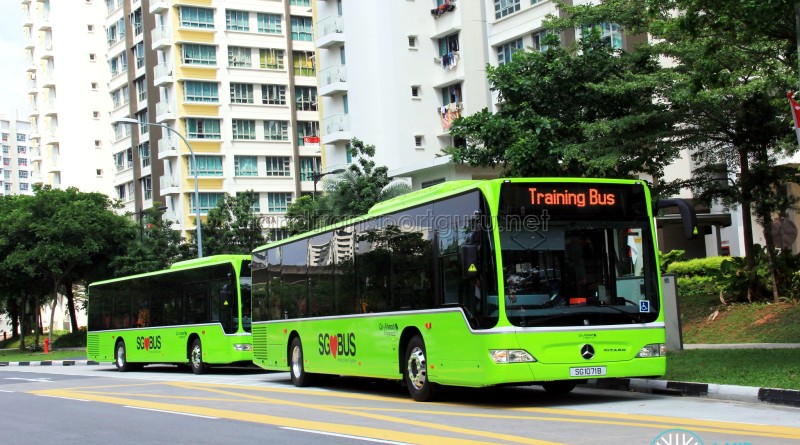
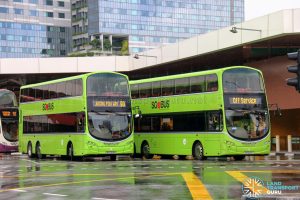
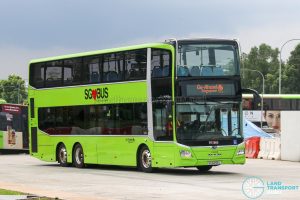
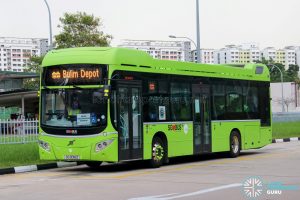
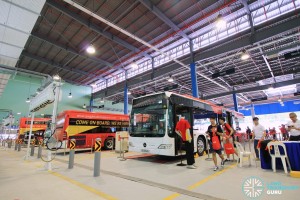
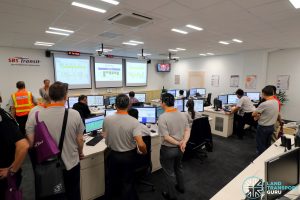
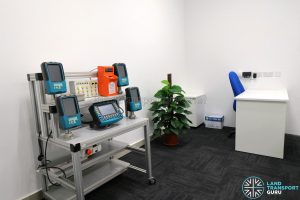
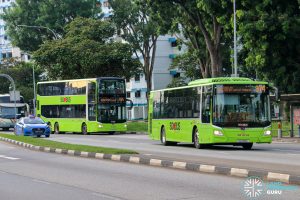
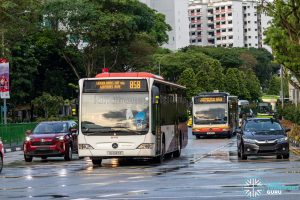
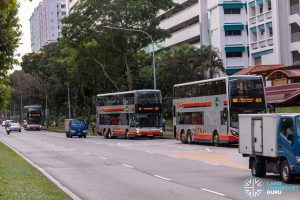
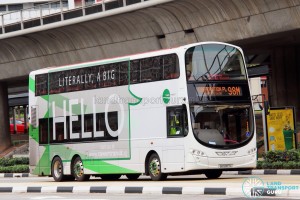
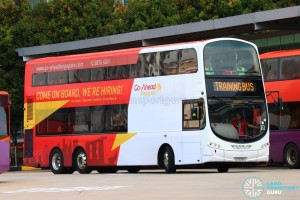
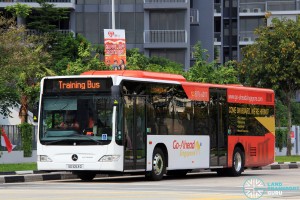
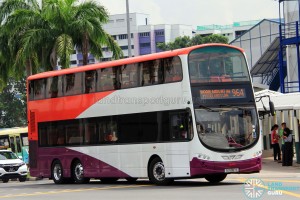
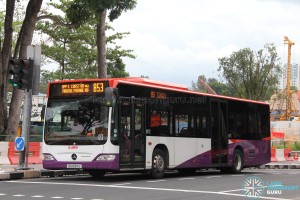
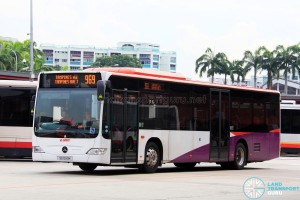
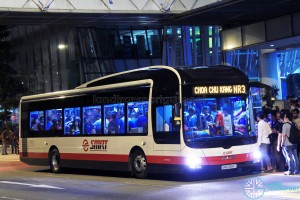
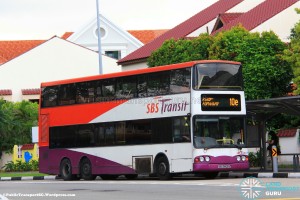
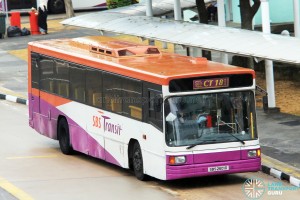
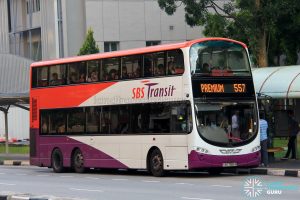
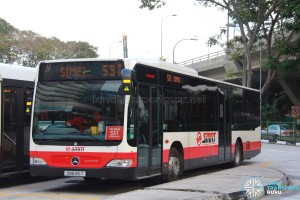
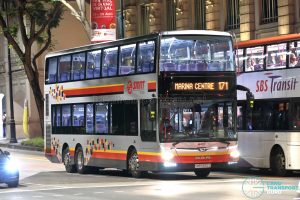
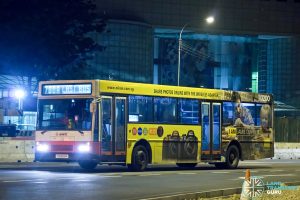
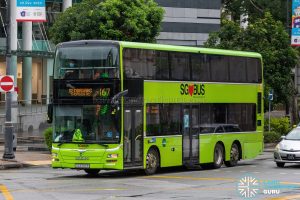
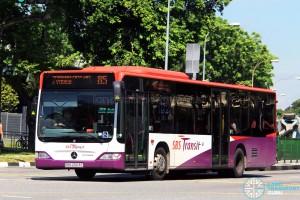
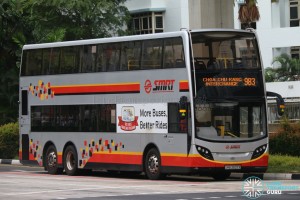

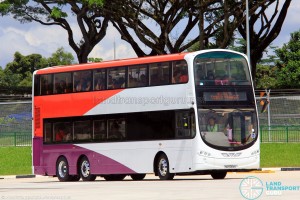
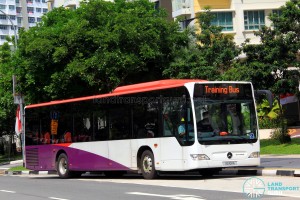
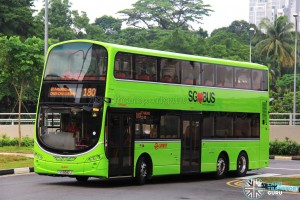
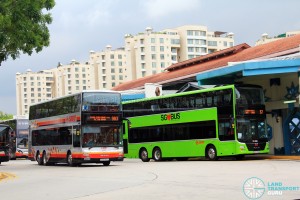
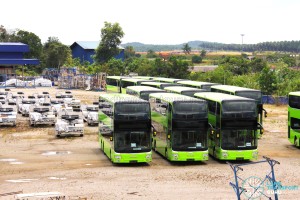
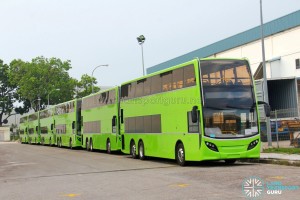
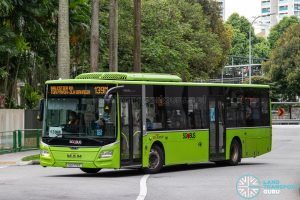
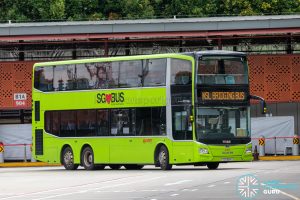
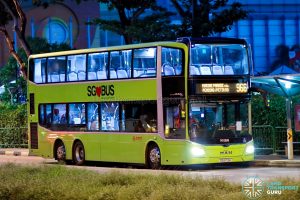
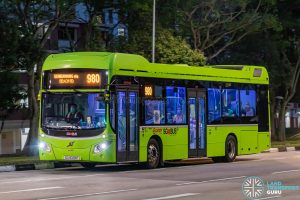
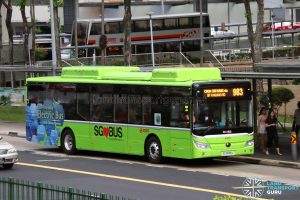
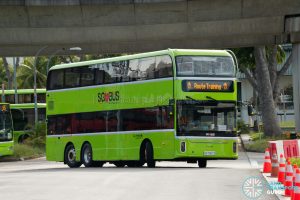
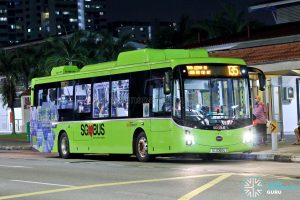
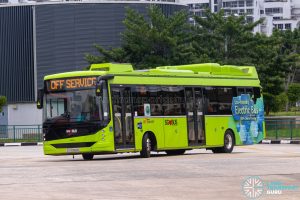

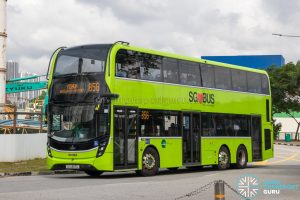
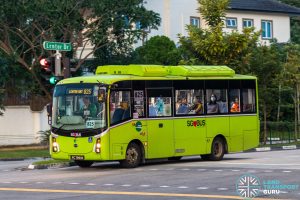
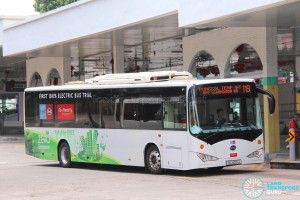
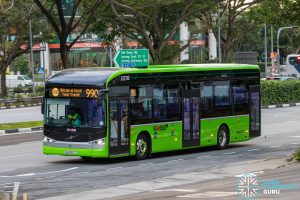
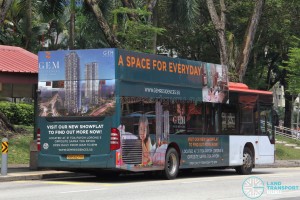
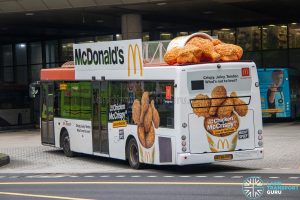
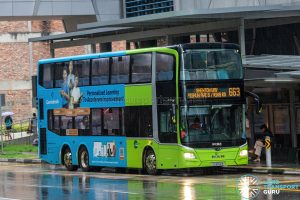
The 3 north region bus packages have the weirdest service allocations tbh. Take YITH for example, SBST controls majority of the services despite being allocated to SBW-YIS under TTS. TTS only has 1/3 share of the bus services despite being the anchor operator of YITH. Even if you break down the services to the packages, Seletar services that operate out of YITH outnumbers SBW-YIS services. Why is this so?
Woodlands package seems to be given the short end of the stick. It has way less services than SBW-YIS and the latter package eats up most of the long distance 96x services that were originally under SMRT. Why the heck is 963/e and 966 even in SBW-YIS when its catchment is in the north-west area?
Personally, I feel that the services in the packages need reshuffling. The anchor operator of an interchange should control majority of the services in the interchange in my opinon. Feeder services should be operated by the anchor operator of the interchange since its catchment is obviously going to be in the strictly within the area of the bus interchange.
My suggestions for the reallocation of the services:
1. All YITH feeders, 800, 803, 804, 805, 806, 807, 811, 812 transferred from Seletar to Sembwang-Yishun. I contemplated adding the other Yishun Seletar trunk services for the sake of consistency but this will create a severe imbalance in the depot allocation. SBW-YIS will be overcrowded with too many services and Seletar package will also lose way too many services. Besides, 851/e and 852’s catchment is in the AMK area while 860 already operates from a Seletar-anchored bus int (YCK) so it makes more sense for just the feeders to go to SBW-YIS instead.
2. 169 and 825 transferred from Sembawang-Yishun to Seletar. 825 is a no-brainer choice since it operates out of YCK int as for 169, it can be argued at Woodlands package will be suitable as well but if Seletar has to sacrifice all the YIS feeders, then I guess Seletar can take in 169 to make up for the shortfall.
3. 963, 963e, 965, 966, 969 transferred from Sembawang-Yishun to Woodlands. All 96x trunks are better off being consolidated in Woodlands package for consistency. 858 can remain with SBW-YIS for consistency with other SBW-YIS 85x numbered services.
4. 110 transferred from Woodlands to Seletar. Since 110 buses park at SEDEP anyway so might as well give 110 to Seletar. Sengkang-Hougang seems to be the more appropriate choice but I suspect 110 was given to Woodlands in the first place because Sengkang-Hougang already has a lot of services in its plate. Alternatively 161 can be swapped out to Woodlands while Sengkang-Hougang intakes 110.
With the reallocation, SBW-YIS will have a net gain of 1 service, Woodlands will have a net gain of 3 services, and Seletar will have a net loss of 6 services. Despite SBW-YIS gaining 1 more service, it is more resource efficient as the feeder services combined requires fewer buses to run than the long-haul trunks given to other packages. SEDEP will also be freed up and the designated operator can dedicate more resources in its core area, namely AMK.
Would prefer GAS intake Bulim & Sengkang-Hougang
TTS intake Loyang & Choa Chu kang-Bukit Panjang
SMRTB operates Jurong West,Seletar & Woodlands
SBST remaining Bukit Merah,Sembawang-Yishun,Bedok,Tampines,Serangoon-Eunos,Clementi & Bishan-Toa Payoh.
The BCM should split Sengkang-Hougang packages. 32 services is too much. Get at least 15 services to Hougang and 17 to Sengkang.
Sengkang – Buangkok should be in Sengkang Bus Package
Hougang bus svcs should be in a separate bus package called Hougang Bus Package.
2024:Sengkang~Hougang Package>Go-Ahead SG
2025:Seletar Package>SMRT Buses
2026:Bulim Package>Go-Ahead SG
Sembawang~Yishun Package>SBS Transit
Loyang Package>Tower Transit SG
Woodlands Package>SMRT Buses
Choa Chu Kang~Bukit Panjang Package>Tower Transit SG
2027 onwards
Bedok,Tampines,Serangoon~Eunos,Clementi,Bishan~Toa Payoh & Bukit Merah Packages>SBS Transit.
Jurong Region Line>SMRT Trains
Cross Island Lines>SBS Transit Rails